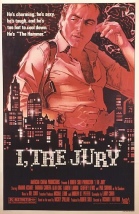I, The Jury
|  In the 1982 updating of Mickey Spillane's 1947 novel "I, The Jury," hard-boiled detective Mike Hammer is a Vietnam vet who drives a shiny bronze Trans Am, dresses like Don Johnson in "Miami Vice" with less pastels, and has sworn off alcohol. However, he still smokes his Lucky Strikes, detests all forms of authority, and kills at a whim. Beyond that, the updated film retains little or no resemblance to the original pulpy page-turner by Spillane, probably the most infamous and often reviled of all mystery writers. In the 1982 updating of Mickey Spillane's 1947 novel "I, The Jury," hard-boiled detective Mike Hammer is a Vietnam vet who drives a shiny bronze Trans Am, dresses like Don Johnson in "Miami Vice" with less pastels, and has sworn off alcohol. However, he still smokes his Lucky Strikes, detests all forms of authority, and kills at a whim. Beyond that, the updated film retains little or no resemblance to the original pulpy page-turner by Spillane, probably the most infamous and often reviled of all mystery writers.The movie starts off with a bang: a howler of an opening credits sequence that is a cheap steal from the James Bond series, complete with cheesy graphics and an overbearing jazz score by Bill Conti ("Rocky"). After that, the movie and the book begin the same, with the murder of Jack Williams (Frederick Downs), a one-armed detective and Hammer's best friend. Hammer declares that he will seek vengeance for Jack's death, and with the help of his devoted secretary, the blond and shapely Velda (Laurene Landon), and the alternately friendly / antagonistic police chief Pat Chambers (Paul Sorvino), he is immediately on the killer's trail. Here the movie splits completely from the book, and dives into a convoluted and improbable tale of government conspiracy and mind control tactics involving the Mafia, the CIA, one of Hammer's Vietnam vet buddies, and a kinky sex clinic. Many of the same characters from the book appear in the movie, but they take on slightly different roles. For instance, Charles Kalecki (Alan King), a numbers runner and narcotics dealer in the book, turns into a suave mob boss. And, more importantly, Hammer's suspicious love interest, Charlotte Bennett (Barbara Carrera), morphs from a run-of-the-mill psychiatrist into the coordinator and founder of the sex clinic. "I, The Jury" is one of several cinematic renditions of Spillane's books (including a 1953 version which was made in 3-D), but this film differs from those earlier versions in one major way: it includes all of the sex and violence Spillane wrote about that could never be given screen treatment due to Hollywood's production code. Although this takes the 1982 version of "I, The Jury" closer to the core of the original subject matter, it is in this aspect that the film received the most criticism, because it took this new license to extremes that many argued surpassed what was in the book. Rest assured, the movie not only includes a great deal of nudity, but it is thoroughly violent, especially toward women. It features one woman having her neck slashed, a set of twins forced to strip before being stabbed to death by a psychotic sexual deviant programmed by the CIA (Judson Scott), and another woman shot point-blank in the belly by Hammer himself. No one would deny that Spillane's writing has a definite misogynistic nature, but the movie seems to take it a step further by giving it such glorious screen treatment; its constant equation of sex and violence, much of which is played with the intention of being erotic, is quite unsettling. It's no surprise that the movie, like the book, fades to black with a dead woman on the floor. "I, The Jury" had a troubled production and was not well-supported by the studio that made it, which is one explanation why it didn't do well in theaters and many people have forgotten that it was ever made. The script was written by Larry Cohen, who is best known for his creatively cheesy but nonetheless effective monster movies, like "It's Alive" (1974) and its two sequels, "Q" (1981), and "The Stuff" (1985). Cohen wrote the script thinking he was going to helm the project as well, but he was yanked from the director's chair after only a week's worth of shooting because he was already $100,000 over budget. He was quickly replaced by Richard T. Heffron, who has worked for the last three decades on a handful of undistinguished movies and dozens of television projects. Heffron was obviously brought in not for his talent, but because he could make the movie rapidly and efficiently. It shows in the final product. Cohen had personal interest in the updated version of Hammer, but Heffron has none. He shot the movie quickly and clumsily, and although some scenes ring true, most of them are flat, trite, and invariably dull. The movie features numerous car chases, shoot-outs, and stunts, but Heffron's background in television is the dominant tone; despite the graphic violence and full-frontal nudity, "I, The Jury," takes on the air of a made-for-TV quickie, with no real punch or depth. But the problems in "I, The Jury" run deeper than the technical. The central fault in this updating is Mike Hammer, whose character was lost in the shuffle while updating from the fifties to the eighties. Because Spillane wrote all his Hammer mysteries in the first person, Hammer's character is central to the tale because all the events are filtered through his persona. We never really get that impression in the movie -- there is no first-person voice-over narration and some scenes don't have Hammer in them at all. Consequently, a great deal of the texture of Spillane's storytelling is lost. The period updating turns out to be a detrimentally bad idea because much of Hammer's moral code is thrown to the wind. Despite his characterization as a hard-nosed, violent, misogynistic killer, Hammer always stuck fervently to his own moral code. The title itself, "I, The Jury," refers to his anti-establishment notion of being his own law. Unlike private eyes who seek out the bad guys and then turn them over the police, Hammer both pursues the criminal and exacts the punishment. In this way, he can be seen as "above the law," but he still adheres strictly to his own personal code of conduct, his own morality. The movie forgoes that aspect of his character, and Hammer comes off not only as amoral in society's terms, but in any terms, especially his own. If anything, Hammer always had his professionalism, but the movie does away with that in the first three minutes by showing him rolling in the sack with the wife of a client who had paid him to find out if that wife was being unfaithful. Maybe the scene was intended for laughs, but it only cheapens Hammer's character and is, by all accounts, a lousy way to start the movie. The blame for Hammer's character can't be laid on Assante's shoulders, because despite some unnecessary Marlon Brandon-like mumbling, he delivers a fine performance. Spillane never once described Hammer's physical attributes in any of the dozen books in which he appeared, so any actor could conceivably portray him. Of course, because of the lack of written description, those who have read Spillane's books will have a strong personal notion of what Hammer looks like, and therefore almost any screen incarnation will somehow fall short of expectations (Spillane, who played the character himself in 1963's "The Girl Hunters," is generally considered the best of the film Hammers). The rest of actors are most un-noteworthy. With the exceptions of Alan King and Paul Sorvino, everyone who appeared in "I, The Jury" were up-and-comers who basically went nowhere. Many of them ended up working in television (like Carrera, who had a short stint on "Dallas" in the mid-eighties), which only adds to the made-for-TV atmosphere of the film. Maybe someday, someone will manage to get the right elements together and make an effective film rendition of a Spillane book, but this is certainly not it. Copyright © 1998 James Kendrick |
Overall Rating: 
 (1.5)
(1.5)


